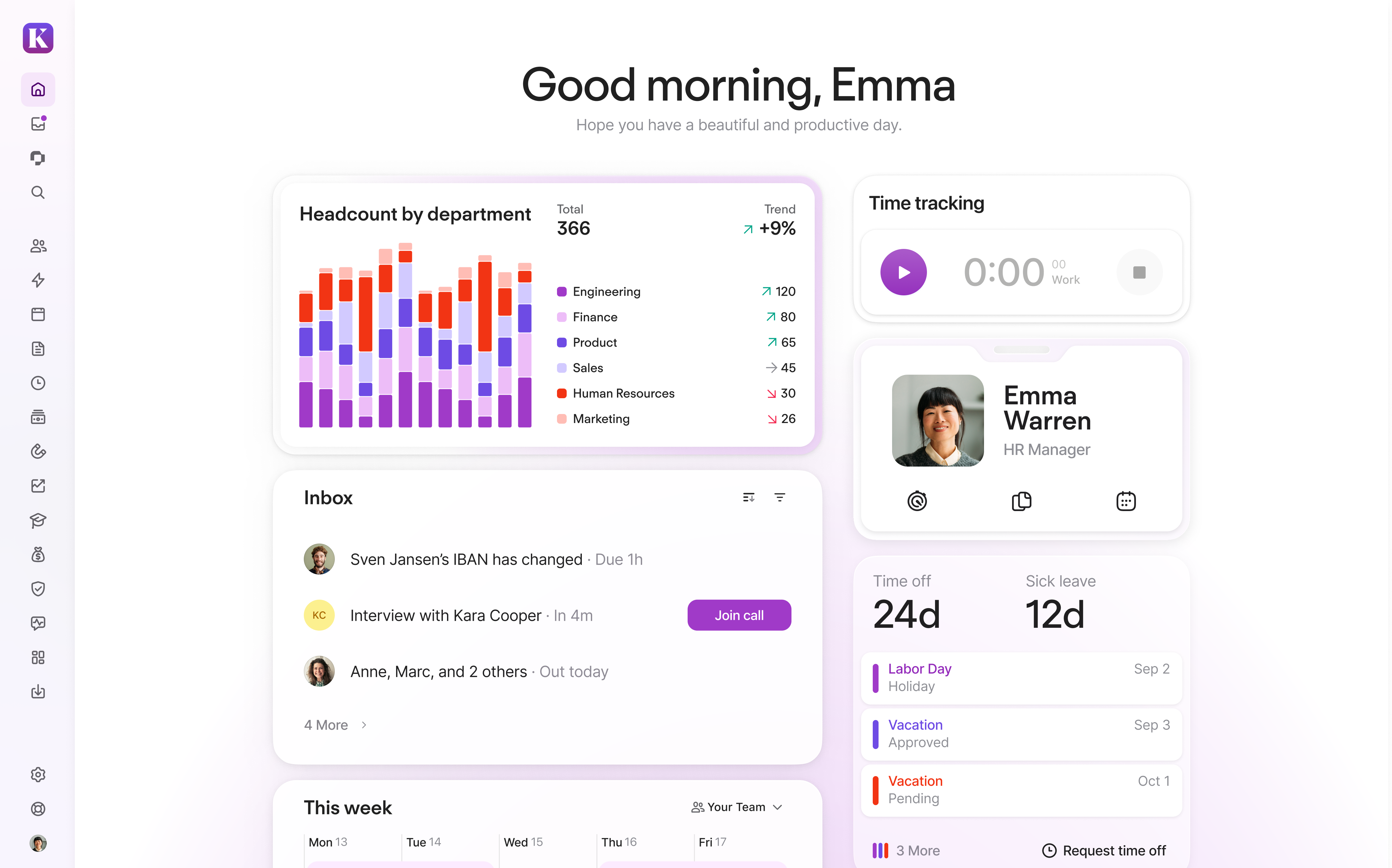What Is Work Ethic & What Goes Into a Great One?

Let’s talk about work ethic. In this article, we offer a clear definition of the term, relevant examples and crucial tips on increasing work ethic among your workforce.
Key Facts
A work ethic is a personal set of values that determines how any employee approaches their work.
Employees with strong work ethics are highly motivated and produce consistently high-quality results.
A good work ethic can be taught as long as more productive behaviours are clearly demonstrated to your employees.
Contents
- 1What Is a Strong Work Ethic?
- 2The Importance of a Strong Work Ethic
- 3Benefits of Strong Work Ethics
- 4Examples of Strong Work Ethics
- 5Difference Between Strong and Poor Work Ethics
- 65 Tips on How To Develop a Strong Work Ethic
- 7Frequently Asked Questions About Work Ethics
- 8Building Strong Work Ethics in Your Staff With Personio
What Is a Strong Work Ethic?
A work ethic is a personal set of standards for acceptable behaviours in the workplace. Work ethic directly influences how someone approaches their daily tasks, as they are driven by the passion and enjoyment they have for their work. Employees with a strong work ethic are often seen as competitive due to their drive to complete work goals.
The Importance of a Strong Work Ethic
Workers with strong work ethics often far outpace their peers when it comes to achieving company objectives. An employee with a good work ethic can produce high-quality work consistently that helps move the organisation forward.
Along with their often professional attitudes within the workplace, employees like these exhibit model behaviour for others to emulate. Their outlook and behaviours can have a positive impact on other employees.
Benefits of Strong Work Ethics
A workforce composed of employees with strong work ethics provides several benefits to your company as a whole. They include:
Increased Productivity. Employees with strong work ethics take their work seriously and devote their working hours to going above and beyond what’s required of them. Their passion for their job means that they’ll complete tasks quickly and to the best of their ability.
Higher Quality Employees to Advance. Employees with a good work ethic are good candidates for leadership positions. Their positive behaviours can become a model for more employees in this manner while serving as a motivational manager, potentially improving productivity and happiness at work.
Creates a Respectable Workplace. A strong work ethic often involves showing professionalism toward leaders and colleagues. The more employees demonstrate this behaviour, the more respectable your workplace acts and feels.
Ensure a Higher Employee Engagement

Motivate your employees with regular, transparent feedback and make them more productive.
Learn more hereExamples of Strong Work Ethics
These four examples illustrate different examples of what a strong work ethic can look like.
Example #1: George
George takes meticulous care in producing the best results possible. He submits his work on time and of consistent quality. Before submitting, George takes the time to check for mistakes, so managers have little to nothing to revise.
Example #2: Olivia
Olivia is known to be one of the most reliable people in the workplace. She arrives at work five minutes early every day. Additionally, her managers know that she’ll complete any work given to her within the deadline, while her colleagues know her as someone who will follow through on covering shifts for others.
Example #3: David
David pays careful attention to the tasks at hand. He stays focused until the tasks are complete. His time management skills mean he builds in breaks when needed.
Example #4: Jodi
Jodi takes responsibility for her tasks in the workplace. She works diligently to ensure everything is completed accurately and on time. If something goes wrong, she takes responsibility and works with the team toward a solution.
Difference Between Strong and Poor Work Ethics
You can tell employees with strong and poor work ethics apart fairly easily. The two concepts are directly opposed, and, as a result, so are their behaviours…
Strong Work Ethic | Poor Work Ethic | |
|---|---|---|
Persistence | Will continue to work on something even if it’s difficult. If they don’t know how to proceed, they ask for guidance. | Will not want to do difficult work and will avoid asking for help or tips. Will leave it to the last minute to complete. |
Professionalism | Works to maintain professionalism within the workplace in every situation. | Doesn’t care about professionalism. Will often cause disruptions in the organisation’s typical processes. |
Collaboration | Understands that the company benefits more when employees can display teamwork in the workplace. Strives to contribute as much as possible within a group setting. | Doesn’t care about creating an open, collaborative workplace. Will often disrupt group settings with behaviour that minimises their colleagues’ contributions. |
Responsibility | Respects the work they are given and is consistent in completing it. They also take responsibility for any mistakes and work to correct them. | Doesn’t take their duties within the workplace seriously. Job-related tasks will rarely be their first priority. |
5 Tips on How To Develop a Strong Work Ethic
Many employees will naturally display a good or poor work ethic after they’re hired. While hiring employees with a strong work ethic takes fewer resources, those behaviours can be taught.
Below are a few tips to help you guide your employees toward more effective workplace practices…
1. Create Strong Mentorship and Training Programmes
Clear and concise instruction on the type of behaviour you expect from new employees can help mitigate any non-productive characteristics.
Mentorship puts new hires under the wing of your best senior workers so they can learn firsthand what a strong work ethic looks like. A programme like this can also help with talent acquisition, as potential employees with a good work ethic will want to participate.
Alternatively, you can take a more academic approach with an eye-catching training programme that guides new hires through the most productive ways of doing their jobs. Whichever your company’s style, employees with a good work ethic will benefit.
Finally, you may need to consider developing and implementing a career progression framework to help employees understand the tangible outcomes of a strong work ethic.
Best practice: Having trouble identifying the best candidates for mentorship or training opportunities? Consider using the 9 box grid method to map things out).
2. Remove Obstacles
A strong work ethic hinges on employees’ passion. It often requires engagement with the company itself, and workplace negativity can get in the way of that. Identifying stress-causing characteristics like bullying and working to improve them can help encourage the enthusiasm needed to perform their responsibilities in full.
3. Meet Your Employees’ Needs
Employees tend to show a higher level of engagement with their company when their individual needs are met. What these needs are can vary. Some want to improve their skills, and others want a more flexible schedule to meet personal commitments. If your organisation works to accommodate these needs, employees will feel more connected to it and more motivated within their roles.
4. Build a Culture That Encourages Positive Behaviour
It’s challenging for employees to develop good work ethics in settings where the opposite is prevalent. An employee with a positive work ethic can encourage that behaviour in others, but the opposite is true as well. To avoid an overflow of employees with poor work ethics, build a culture that rewards positive actions and discourages negative behaviours.
5. Set a Good Example
Showing a consistently good work ethic as the leader of an organisation is one of the most reliable ways to encourage those behaviours in your workforce. Leadership is among the most notable figures within your organisation, and if leadership builds a reputation for passion, responsibility and collaboration, then others may follow your lead. From there, your example can cascade to as many employees as possible.
Frequently Asked Questions About Work Ethics
What Is the Meaning of Work Ethic?
A work ethic is a personal set of values that determines how an employee behaves in the workplace. An employee can have a good work ethic or a bad one, and each one influences behaviours in the workplace in their own way.
What Is a Good Work Ethic?
Employees with a good work ethic are highly engaged with the organisation and passionate about their work. They’re reliable and consistently produce high-quality results to help the company achieve its goals.
How Do You Improve Your Work Ethic?
There are several ways an organisation can improve its employees’ work ethics. These methods include:
Setting up mentorship and training programmes to directly demonstrate a strong work ethic
Removing stress-inducing obstacles that keep employees from engaging with the company
Meeting individual employees’ needs to encourage greater engagement
Changing the overall company culture to encourage positive work ethics
Demonstrating the positive behaviours that you’d like to see in your staff
Building Strong Work Ethics in Your Staff With Personio
Having employees with strong work ethics is vital to the continued growth of your company, just as bad work ethics can stall your progress. Personio can help develop positive behaviours in your staff with its applicant tracking tool that helps you find high-impact employees. Book your free demo to learn how else Personio can help your business today.
Disclaimer
We would like to inform you that the contents of our website (including any legal contributions) are for non-binding informational purposes only and does not in any way constitute legal advice. The content of this information cannot and is not intended to replace individual and binding legal advice from e.g. a lawyer that addresses your specific situation. In this respect, all information provided is without guarantee of correctness, completeness and up-to-dateness.

